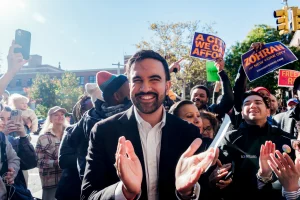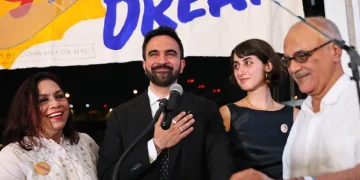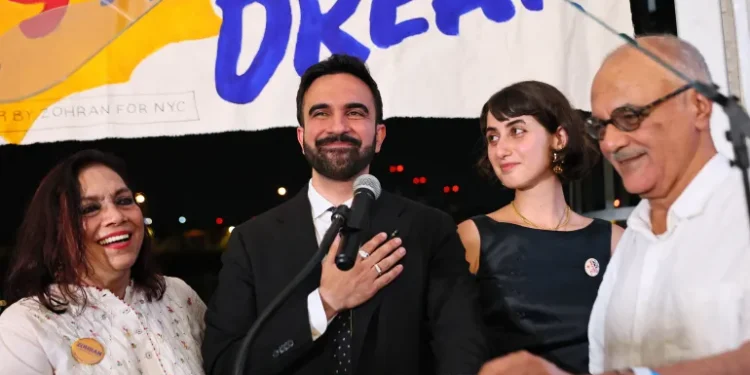New York City — Ugandan-born Zohran Mamdani is the new Mayor of New York City in the United States of America.
When Zohran Kwame Mamdani was born in Kampala, Uganda, in 1991, few could have imagined that three decades later, he would become the mayor of New York City — the first African-born, Muslim, and South Asian to hold the office in America’s largest metropolis.
Mamdani was elected the 111th Mayor of New York City in the general election held on Tuesday, November 4, 2025. He is the Mayor-elect and will officially assume office on January 1, 2026, succeeding the current mayor, Eric Adams.
The 34-year-old Democratic Socialist’s victory in the 2025 mayoral election over former New York governor Andrew Cuomo is being described as one of the most remarkable upsets in recent American political history — a story of conviction, grassroots organising, and generational change.
A Mandate for Change
In an election that drew the highest voter turnout since 1993, Mamdani captured over 50% of the vote, defeating Cuomo, who ran as an independent, and Republican candidate Curtis Sliwa. His campaign was powered by a coalition of young voters, renters, working-class families, and first-time participants in city politics — many of whom said they were drawn to Mamdani’s promise to make New York “a city we can afford to live in again.”
Standing before a jubilant crowd at Brooklyn Paramount, Mamdani opened his victory speech with a line from early 20th-century socialist Eugene Debs:
“The sun may have set over our city this evening,” he said, “but I can see the dawn of a better day for humanity.”
It was a moment heavy with symbolism. The son of Ugandan-born scholar Mahmood Mamdani and Indian filmmaker Mira Nair, Zohran Mamdani grew up between worlds — from Kampala to Cape Town to New York City. His journey from a child of academics to mayor of the world’s financial capital reflects the changing face of global politics and the growing influence of diasporic communities.

From Kampala to Queens
Mamdani’s early life reads like a postcolonial odyssey. Born in Kampala, he spent his early childhood in Uganda before his family relocated to South Africa, where his father headed the Institute for African Studies at the University of Cape Town. At age seven, the family moved to New York City, settling in Morningside Heights.
He attended the Bronx High School of Science and Bowdoin College, where he studied Africana Studies and co-founded the campus chapter of Students for Justice in Palestine. Before entering politics, he worked as a housing counsellor, helping immigrant families avoid eviction — an experience that shaped his political philosophy.
“It was in those apartments in Queens that I saw how policy shapes people’s lives,” Mamdani has said. “That’s where I learned that housing isn’t just an issue — it’s survival.”
The Hip-Hop Politician
Before politics, Mamdani was a hip-hop artist. Under the name Young Cardamom, he collaborated with Ugandan rapper HAB on the 2016 hit Kanda (Chap Chap) — an ode to Kampala’s beloved street food, chapati. The duo performed at Uganda’s Nyege Nyege Festival, and Mamdani went on to produce the soundtrack for Queen of Katwe, his mother’s acclaimed Disney film about a Ugandan chess prodigy.
Music, he says, taught him “rhythm, story, and connection” — the same tools he now uses in politics.

Breaking Through in Politics
Mamdani entered politics as a campaign manager for progressive candidates in New York, eventually running for the State Assembly in 2020. His victory over a five-term incumbent in Astoria marked the arrival of a new political voice — unapologetically left-wing, deeply rooted in immigrant experience, and fluent in the language of both activism and the algorithm.
By 2025, he had become one of the most recognisable faces of New York’s progressive movement, with 1.7 million TikTok followers and a message that resonated across boroughs: “Housing is a human right. Transit should be free. Childcare should be universal.”
His campaign’s affordability platform included fare-free city buses, city-owned grocery stores, a $30 minimum wage by 2030, and 200,000 new affordable housing units — paid for by higher taxes on millionaires and corporations.
While critics, including Donald Trump, derided him as a “communist,” Mamdani wore the label of “democratic socialist” with pride.
“It means giving a voice to workers, not corporations,” he told supporters. “It means a city where every family, not just the wealthy, can dream.”
A Generational Earthquake
Political analyst Drew Engelhardt of Stony Brook University called Mamdani’s victory “a generational earthquake.”
“Voters — especially younger ones — see Mamdani as credible because he speaks their language and lives their reality,” Engelhardt said. “Even if his policies face resistance, they trust that he’s fighting for them.”
Exit polls showed that 70% of voters under 45 supported Mamdani, and two-thirds of all first-time mayoral voters cast ballots in his favour.
His rise also coincides with growing disillusionment inside the Democratic Party, which many see as dominated by ageing power brokers. Mamdani capitalised on that frustration, branding Cuomo as the embodiment of “politics that abandons the many and serves the few.”
A New Kind of Mayor
Mamdani’s election marks a series of historic firsts: First Muslim mayor of New York City, First of South Asian heritage, First-born in Africa (Kampala, Uganda) and Youngest mayor in more than a century.

But with the historic win comes heavy scrutiny. President Trump has already threatened to cut federal funding to New York City, calling Mamdani’s victory “the beginning of communism.” Business leaders are watching closely to see how his administration handles the city’s economic and housing challenges.
Yet Mamdani seems unfazed. In his first press conference as mayor-elect, he said: “This is not about ideology; it’s about survival. New York must remain a city for everyone — not just those who can afford to stay.”
From Kampala to City Hall
To many Ugandans, Mamdani’s victory is personal. His father, Prof. Mahmood Mamdani, is one of Africa’s most influential thinkers, while his mother, Mira Nair, has long bridged worlds through cinema. In Kampala, where the family’s ties remain strong, news of Zohran’s victory spread fast on social media.
“It shows what the Ugandan spirit can do on the world stage,” one Kampala radio host said. “From Makerere to Manhattan — that’s our story.”
The Dawn He Promised
As dawn broke over New York City, the morning after the election, Mamdani posted a single photo on social media: the skyline over Queens, with the caption — “The future is in our hands.”
For a generation hungry for change — from Kampala to Queens — that message has never felt truer.
Additional Reporting by BBC, CBS News, Al Jazeera and The Guardian









